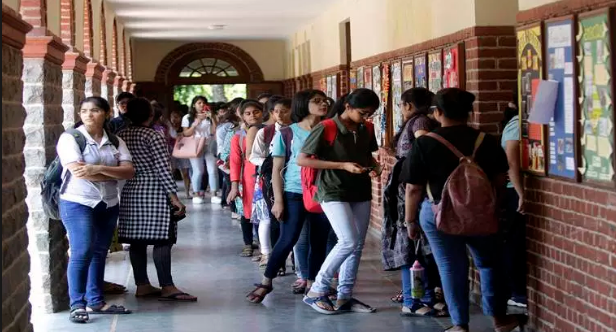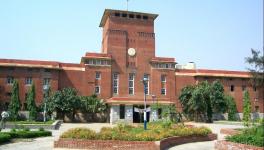EWS Quota in Delhi University: A Not-so-Smooth Road Ahead

Representational image. Image Courtesy: The Indian Express
New Delhi: Aman Srivastav (17) has just passed his class XII exam from Panna, Madhya Pradesh. After securing 72%, he expects he will be lucky enough to get admission in Delhi University under the Economically Weaker Sections (EWS) category. However, he is unsure of getting a hostel after his admission.
“I have seen the cut-off for various courses from previous years and I expect to get admission. As far as the hostel is concerned, I visited some paying guest facilities and the rent ranges from Rs 10,000 to Rs 20,000. This is costly, but I think if I get admission, I will have to share the room with my friend to cut the expenses,” he said.
Hostels are not the sole problem that students like Aman will be facing in the upcoming academic session.
After the EWS reservation quota was cleared, the Ministry of Human Resource Development mandated that the new policy would be implemented from the upcoming session itself. It is expected that the quota will bring 6,000 new students to the university, taking the total number of students to over 60,000, a first in the history of this central university. But is the university ready for the next big leap after Other Backward Classes (OBC) quota was implemented in 2006?
A conversation with college principals suggests that implementation of EWS quota will face a rough road ahead.
Inderjit Singh Bakshi, Principal, Dayal Singh College, says the number of students may not make a major impact but the need for better infrastructure and more teaching positions is imminent given the target
“The OBC expansion is getting implemented in two phases – first 10% and then 15%. I think, the theory section will remain unchanged but certainly there will be changes in tutorial and practical sections," he says. However, he concedes that there will be longer schedule for classes given the limited infrastructure. "I have asked the time-table committee to look how things can be accommodated," he added.
Manoj Sinha, Principal of Aryabhatta College, has other concerns. "We have received the letter from the UniversitY Grants Commission regarding funding for implementation of EWS quota. The commission has said that colleges will receive Rs 5 crore each. Additionally, the university too got funds for infrastructure expansion. I think, for the time being, this will be sufficient. However, there are no clear guidelines regarding the recruitment of teachers. I expect this will be clear soon", he says.
However, many teachers suggest that the load will vary from college to college.
A teacher said that the student load will affect the quality of teaching severely. He said a smaller college may not have much problems, but colleges like Daulat Ram will have more students this time and it will result in more sections. How will these students be taught? he adds. Second, there is no clarity on the present situation of ad hoc teachers. How will they be accommodated post implementation?
Abha Dev Habib, former Delhi University Executive Council member, has similar concerns. She says students under EWS come from different socio-economic backgrounds. So, if s/he does not get enough attention for academic improvement, then purpose of entire exercise will get defeated. So, maintaining student-teacher ratio is must, she says, adding that under the OBC quota, the colleges were to get the money in two tranches. “While first tranche has been received, we are still awaiting the second tranche. In the lack of funding, the colleges cannot sanction teaching posts," she adds.
But, the row over funding is not limited to availability of funds. The university and the UGC have been locking horns over the pattern of funding. The new regime mandates that funding will be done through a new agency named Higher Education Funding Agency or HEFA via loans. Under the new scheme, Delhi University will have to pay 10% of the principal amount, while 90% is payable by the government.
After much protest, the UGC finally, in a letter dated June 10, 2019 allotted Rs 120 crore under object head-35 for EWS expansion. The letter stated," It is also informed that additional funds under allocated under object head (OH)-35 have to be sought from HEFA under window 4." But the teachers are not buying this scheme.
Rajib Ray, President of Delhi University Teachers Association, says the loans from HEFA cannot be justified. "A Rs 120 crore loan entitlement from HEFA has been offered to the University for building its own additional infrastructure and sharing the loan amount with colleges for theirs. So, EWS reservation has been used to tie everyone to loan-based funding. What we are demanding is that the government should release grants for expansion, not loans. Students can't be charged high fees to implement this expansion," he says.
Ray adds: "Under Object Head 36 (salary), the university gets Rs 6.85 crore and colleges, Rs 42.25 crore. The salaries include salary for additional teachers and non-teaching staff but additional posts have not yet been sanctioned. We require the university to act swiftly on the matter and set up a standing committee to look at how this grant will be divided."
Registrar Professor Tarun Kumar Das could not be reached for his comments despite repeated attempts.
Read More: https://www.newsclick.in/higher-educational-institutions-vacancies-6-months-UGC
Get the latest reports & analysis with people's perspective on Protests, movements & deep analytical videos, discussions of the current affairs in your Telegram app. Subscribe to NewsClick's Telegram channel & get Real-Time updates on stories, as they get published on our website.
























